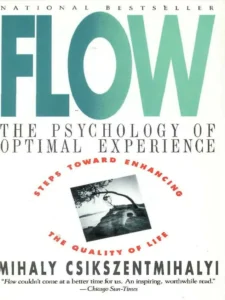In his book “Flow: The Psychology of Optimal Experience,” Mihaly Csikszentmihalyi delves into the idea of “flow,” which is a state characterized by complete immersion and concentration in an activity. During this state, individuals experience profound enjoyment and a sense of accomplishment. Csikszentmihalyi posits that genuine happiness is derived less from external conditions and more from our perceptions and engagement with life’s experiences.
Flow arises when an individual is deeply engrossed in an activity that presents challenges commensurate with their skills, thereby achieving a balance between feelings of boredom and anxiety. The author outlines several critical components of flow, including the presence of clear goals, immediate feedback, and a diminished sense of self-consciousness. He underscores flow’s significance in fostering personal development, creativity, and a sense of purpose.
By organizing one’s life around activities that encourage flow, individuals can improve their overall quality of life, attain self-actualization, and nurture lasting happiness. The book seamlessly integrates insights from psychology and philosophy, offering practical guidance for readers seeking to cultivate more enriching experiences in their work, relationships, and leisure pursuits.

In his influential book, Flow: The Psychology of Optimal Experience, Mihaly Csikszentmihalyi explores the intriguing psychological state known as “flow.” This state is characterized by complete immersion in an activity, heightened concentration, and a profound sense of satisfaction. Csikszentmihalyi argues that true happiness does not primarily stem from external circumstances but rather from the way individuals perceive and structure their experiences. Flow is achieved when people engage in tasks that present a harmonious balance between challenge and skill, featuring well-defined goals, immediate feedback, and a sense of control. Within this state, individuals often lose track of time and self-awareness, becoming wholly engaged in the present moment.
The author further investigates how flow can be nurtured across various life domains, such as work, leisure, and interpersonal relationships. He emphasizes that while external rewards, such as monetary compensation or societal status, may serve as initial motivators, they seldom result in enduring happiness. Instead, Csikszentmihalyi advocates for intrinsic motivation—the pursuit of activities for their own inherent value—as a source of more meaningful and rewarding experiences. He notes that structured activities like sports, artistic endeavors, and challenging work frequently create the ideal conditions for achieving flow. Additionally, he underscores the importance of setting personal goals, seeking new challenges, and honing skills as vital strategies for cultivating a life rich in flow experiences.
Central to the concept of flow is the notion of attention and its pivotal role in shaping our experiences. Csikszentmihalyi asserts that directing attention toward activities that resonate with one’s values and aspirations is crucial for achieving optimal experiences. He also discusses how the experience of flow can enhance creativity, improve problem-solving abilities, and promote personal growth by encouraging individuals to venture beyond their comfort zones while maintaining a sense of capability.
In essence, Flow serves as a comprehensive guide to leading a more engaged and fulfilling life by aligning one’s actions with intrinsic goals and personal values. The text invites readers to reconsider how they allocate their time and energy, urging them to prioritize activities that foster personal development and cultivate a deeper sense of purpose. By actively pursuing flow, individuals can construct lives imbued with meaning, joy, and a sense of achievement.
“Flow: The Psychology of Optimal Experience” by Mihaly Csikszentmihalyi was initially published in 1990 as part of Harper & Row’s initiative to make academic psychological research more accessible to a wider audience. Drawing upon decades of research, Csikszentmihalyi offered groundbreaking insights into the concept of “flow,” which refers to a state of optimal engagement and enjoyment in activities. His work aimed to bridge the divide between scientific inquiry and practical application.
The book was released during a time of increasing interest in positive psychology, aligning with emerging conversations about human happiness and fulfillment. Upon its launch, it garnered widespread acclaim for its clear and approachable language, relatable examples, and significant implications for enhancing the quality of life. Both critics and readers appreciated its combination of academic rigor and practical wisdom, which established it as a foundational text in psychology, self-help, and personal development.
As time progressed, “Flow” achieved bestseller status and continues to influence various fields, including education, sports, business, and creativity. This enduring impact has solidified Csikszentmihalyi’s reputation as a pioneer in the field of positive psychology.
Leave a Reply